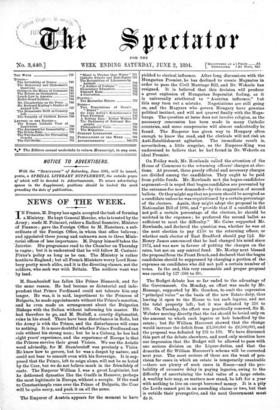The Budget debate has so far ended to the advantage
of the Government. On Monday, an effort was made by Mr. Heneage, supported by Mr. Goschen, to omit the expression "principal value" as the basis of the new Estate-duty, thus leaving it open to the House to tax each legatee, and not the total property left ; but it was defeated by 216 to 189. On Tuesday, the effort was practically renewed, Sir R. Webster moving directly that the tax should be levied only on the amount to which each legatee or heir benefited by the estate ; but Sir William Harcourt showed that the change would increase the deficit from £3,500,000 to £9,500,000, and the proposal was defeated by 231 to 199. We have discussed this part of the debate elsewhere, and need only mention here our impression that the Budget will be allowed to pass with one serious division on the Liquor-duties, and that the demerits of Sir William Harcourt's scheme will be corrected next year. The most serious of these are the want of pro- vision for cases in which an estate is temporarily unsaleable —there are plenty of such cases in Essex—and the pro- bability of excessive delay in paying legacies, owing to the difficulty of ascertaining the total value of a large estate. A wealthy heir may, as matters now stand, be left for a year with nothing to live on except borrowed money. It is a pity the Lords cannot put in an amending clause or two, but that is outside their prerogative, and the next Government must do it.






































